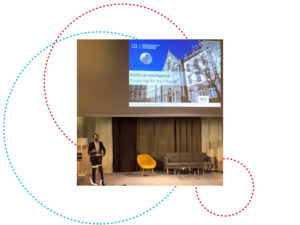The fifth Analytics Summit hosted by SAS and BGL Paribas took place in Luxembourg on 05 June 2018 featuring the LCL director, Benny Mantin, as one of the keynote speakers.
The Analytics Summit is a platform for industry and government experts to interact and share knowledge on analytics and in particular guide organisations through the journey of digitalisation. The 5th edition of the summit focused on artificial intelligence (AI), its impact on industries, the potentials and risks ahead.
In his keynote, Benny Mantin, the LCL’s director, guided the audience through the different scopes of data and emphasized that AI is only one of the data-driven dimensions, and the organisations need to assess their needs and data availability before starting the AI journey.
While AI is based on older innovations, it is only recently that the increasing computing power and greater availability of data that enabled that leap forward in AI capabilities. Indeed, it was only in 2015 that machines starting beating humans in the “puppy or muffin” challenge.
Business can gain enormous benefits from AI-driven applications. A recent study estimated that operations will lead the way with gains estimated in the scope of about $2trn.
Prof. Mantin has outlined the key areas for such applications: network planning, inventory management, warehousing and distribution operation, route optimisation, and quality control. Importantly, however, we need to keep in mind that while the logistics and supply chains are evolving, the customer is changing as well. Prof. Mantin envisions a new model of supply-demand interaction that will reshape business in future years.
The change unleashed by AI can be clustered into three categories: task and occupations which will free us to focus on higher value-added tasks, structure business processes which will allow us to rethink and completely redesign processes, and the emergence of new business models that will unleash a new wave of innovations.
Prof. Mantin briefly discussed the future of jobs, risk and regulatory concerns. He overall concluded the presentation on a positive note suggesting a promising future while encouraging greater emphasis on relevant education.
